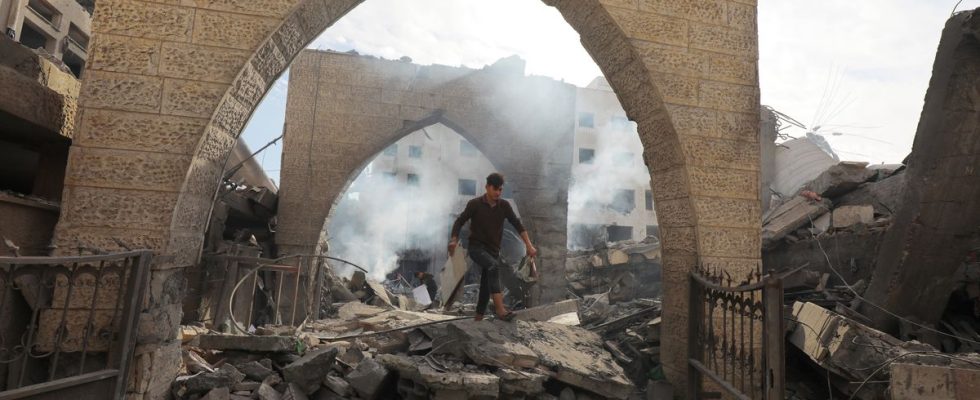To better understand the latest events in the conflict between the Palestinian Islamist movement Hamas and Israel, 20 minutes takes stock every evening. Between the strong declarations, the diplomatic advances or the dramatic results of the fighting, here are the main points of the day.
The fact of the day
The inhabitants of Gaza face an “apocalyptic” situation according to NGOs while the Israeli army continues its slow advance in Khan Younes, fierce fighting continued on Friday from the north to the south of the Palestinian enclave, particularly in this main southern city, where the Israeli army announced that it had taken up positions in the center.
“We took up position in the center of the city. We work methodically, with precision, we move from tunnel to tunnel, from house to house, and we hit terrorists as precisely as possible,” said Gen. Dan Goldfus, commander of the 98th Division, in a video message released by the army. Soldiers discovered a weapons depot in a school, a Hamas command post in a mosque, where “terrorists” were killed, as well as weapons “at the homes of important Hamas cadres,” according to a statement. of the Army.
The number of the day
70. This is the percentage of women and children under 18 who are among the victims of Israeli bombings in the Gaza Strip. The Hamas health ministry announced that airstrikes had killed 17,487 people since the start of the war.
The ministry also reports tens of thousands of injured, many of whom cannot be treated due to lack of resources, caregivers and space in overcrowded hospitals. “We lose dozens of wounded every day due to lack of care,” declared its spokesperson, Ashraf al-Qidreh, pointing out the “delay [nécessaire] to get out of Gaza” the seriously injured.
Sentence of the day
Those who survived the bombings are now at imminent risk of death from starvation and disease.
“Hundreds of children queuing for a single toilet”, “maggots in wounds”, “children amputated without anesthetic”: “we lack words to describe the horrors taking place in Gaza”, indignant Alexandra Saieh, from Save the children. “Children and families are wandering the streets of what has not been razed, without food, with nowhere to go and with nothing to survive,” she continues during a remote briefing of around ten people. NGO with the press.
“No place is safe” in Gaza, denounces Shaina Low of the Norwegian Refugee Council. More than half of the homes there were damaged or destroyed and 1.9 million inhabitants – out of a total of 2.4 ––were displaced by the war, according to the UN. “Israel forces families to move from one dangerous area to another,” she protests during this same videoconference, “whose colleagues, like thousands of other Gazans, “sleep in the streets with their newborns” due to lack of secure shelter.
Today’s trend
Palestinian poet Refaat Alareer was killed in an Israeli strike, his relatives announced on the night of Thursday to Friday. “The assassination of Refaat is tragic, painful and scandalous. It’s an immense loss,” his friend Ahmed Alnaouq commented on X after deadly raids Thursday evening in the north of the Gaza Strip, according to the Hamas administration’s Ministry of Health. “My heart is broken, my friend and colleague Refaat Alareer was killed with his family a few minutes ago I can’t believe it. We each loved picking strawberries together,” his friend, the Gazan poet Mosab Abu Toha, wrote on Facebook.
Professor of English literature at the Islamic University of Gaza, where he notably taught Shakespeare, Refaat Alareer was one of the co-founders of the We are not numbers project, pairing authors from Gaza with “mentors” abroad who help them write stories in English about their reality. He had edited the book Gaza writes backchronicles of life in Gaza by young Palestinian authors, and published Gaza unsilencednot translated into French.

